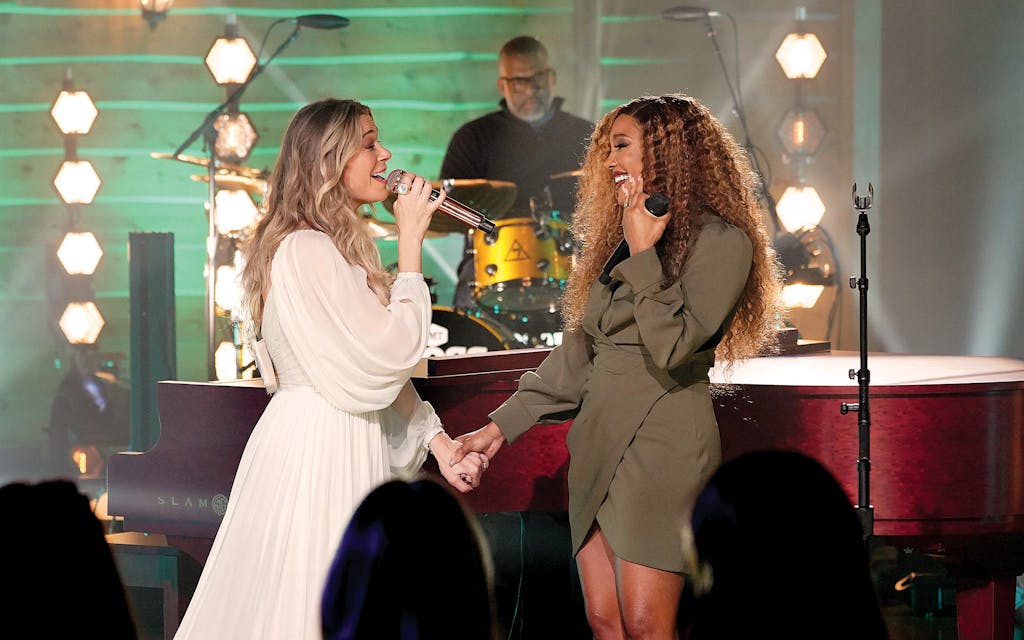In the early nineties Mickey Guyton was a young girl living in the small town of Crawford, a short walk from George W. and Laura Bush’s ranch. One summer evening, she attended a Texas Rangers game, where LeAnn Rimes, who was about the same age, performed the National Anthem. Guyton was so inspired that she declared that she, too, wanted to sing country music.
Today the forty-year-old Guyton is a genuine country star. Over the past five years, she has released a Top 50 album, received four Grammy nominations, recorded a critically praised duet with Kane Brown, cohosted an Academy of Country Music Awards show, and sung the National Anthem at the Super Bowl and, in October, at a World Series game. In 2022 Time magazine named her its Breakthrough Artist of the Year. She’s already written thirty or so songs for an album she hopes to release next summer, and a Hallmark Channel movie derived from her song “Heaven Down Here” airs December 14.
Texas Monthly: Hey, where are you calling from?
Mickey Guyton: Nashville.
TM: You live there full-time?
MG: We also have a home in L.A. that costs us a gazillion dollars. My husband’s a lawyer out there. I’ve been away from him and my two-year-old child for nine days now, and I’m losing my mind.
TM: So you have to know you’ve really made it if the Hallmark Channel makes a Christmas movie based on one of your songs.
MG: I didn’t expect that. The people at Hallmark told me they loved the title of “Heaven Down Here,” and they thought that they could write a beautiful Christmas movie around it. And I was like, “It would be my honor to be part of a Hallmark Christmas movie.” They asked if I wanted to be in it. I said that I didn’t know if I could act or not. I think I was just too scared.
TM: Take me back to your childhood. Were you always a fan of country music?
MG: I grew up in the country. Like the actual country, on gravel dirt roads. If you saw where my grandma lived, it doesn’t get more country. I would go to her house, and on the back of her door she would have VHS tapes of singers like Dolly Parton and Kenny Rogers. I also listened to George Strait. For me, there was just something so beautiful about a country song.
TM: You attended Santa Monica College, in California. I assume you didn’t move there to pursue a country music career.
MG: I didn’t think anyone would take me seriously as a country singer. A Black female country singer didn’t have an easy path to Nashville. So I decided to pursue something else in entertainment. And I thought, “Oh, the sunshine state of California! I could live there.”
TM: In 2007 you auditioned for American Idol, but you didn’t audition with a country song.
MG: I performed “(You Make Me Feel Like) A Natural Woman” by Aretha Franklin.
TM: So when did you throw caution to the wind and come out publicly as a country singer?
MG: It’s a strange story. I went through a bad romantic breakup in California. I was alone, my career was going nowhere, and I just wanted to move back home with my family, get a job, and live my life. Then, on the very day that I was going to fly home to Texas, I ran into this hip-hop deejay that I knew, and I told him things weren’t working out for me. He said, “Mickey, what kind of music do you really want to sing?” And I took a breath and said, “Well, I have a love for country music.” It turned out he knew someone who had produced some of Glen Campbell’s records, and that man introduced me to Keith Urban’s manager. In 2010 I flew out to Nashville and eventually I got to sing for an executive at Capitol Records and perform at a festival. And out of the blue, I got a record deal and was moving to Nashville. It was amazing to be embraced like that.

TM: Despite the publicity you received for signing a record deal [in 2011, Guyton was the only Black female country singer with a major-label contract], it took you a while to gain traction.
MG: I remember I was sitting at a bar with my husband, and I asked him, “Why do you think it’s not working for me?” And he said, “Country is still three chords and the truth, right? So why don’t you write your truth? Why aren’t you writing from your own perspective? You’re running away from everything that makes you different.” And a couple of weeks later, I wrote “Black Like Me.”
TM: You released it in June 2020, after the George Floyd killing.
MG: I had no intentions of putting that song out. It didn’t seem to fit the country music audience at all. It was more of a therapy song for me. [“If you think we live in the land of the free / You should try to be Black like me,” goes one line.] But I thought back on my conversation with my husband and I realized that this was something I needed to share. So I posted a demo of the song on Instagram.
TM: “Black Like Me” received a Grammy nomination for Best Country Solo Performance, making you the first Black female artist to be recognized in that category. You began to write more songs about young women grappling with disillusionment in a predominantly white male world. Did you feel you had finally made your mark in Nashville?
MG: I felt good about my music, but I knew I was always just a step away from failure. You can talk to some of the greatest female legends of country music, and they will tell you it’s the same for them. It’s really hard for women.
TM: Did you still feel like an outsider among some country fans?
MG: Sometimes I did. Sometimes I do now.
TM: You’ve probably seen this study that found that the percentage of women on country radio has sunk from 33 percent to 11 percent. And Luke Combs’s cover of Tracy Chapman’s “Fast Car” recently went to number one. You have to wonder if that would have happened if it had been sung by a Black female country music singer.
MG: You’re asking the tough questions. The only way I believe anything can change is if successful artists stick their necks out to push country fans to listen more to women.
TM: Give me an example.
MG: I have a friend who was on tour with Kenny Chesney, and at one point Kenny called up radio stations and was like, “You need to play this girl’s song.” That’s the kind of advocacy we need.
TM: When you hear about racially divisive songs that are playing nonstop on the radio, like Jason Aldean’s “Try That in a Small Town,” do you think that nothing will ever change?
MG: I have to say that sometimes I do. I just met a Black artist two days ago here in Nashville, and she is really talented. But she told me she wasn’t getting opportunities to perform. I said, “All I can tell you is that you have to keep showing up and doing what you love to do, because your dreams are valid. If you stick to your true self, you’ll find your audience.”
TM: But it’s still hard.
MG: Very.
TM: Finally, the most important question of the day: Do you
ever have time to get back to Texas?
MG: We’re going to be in Texas for Christmas. Maybe I’ll see you.
This interview has been edited for clarity and length.
This article originally appeared in the December 2023 issue of Texas Monthly with the headline “Mickey Guyton Is Still Finding Her Way in the Country Music Industry.” Subscribe today.









